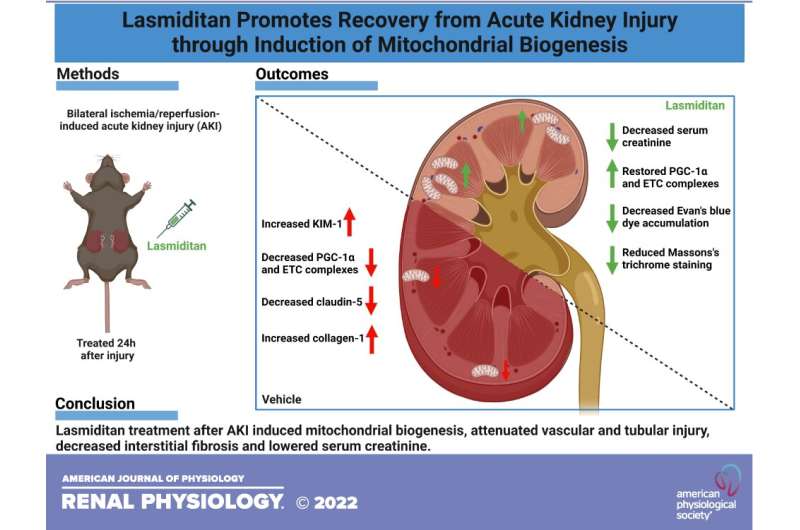Graphical abstract. Credit: American Journal of Physiology-Renal Physiology (2022). DOI: 10.1152/ajprenal.00249.2022
The drug lasmiditan, which is used to treat migraines, shows promise as a possible treatment for acute kidney injury, according to a new study from the University of Arizona. The findings are published ahead of print in the American Journal of Physiology–Renal Physiology.
Researchers conducting this study are working to develop a drug to treat acute kidney injury. The disease, which is characterized by rapid kidney failure, occurs in approximately 8% to 16% of hospitalized people and affects more than 13 million people worldwide. The condition can be caused by a variety of factors, including some medications and sepsis. Acute kidney injury can lead to physiological problems, such as mitochondrial dysfunction, damage to small blood vessels in the kidney and loss of renal tubular function. Currently, there is no treatment for acute kidney injury.
Credit: American Physiological Society
Physiologists treated a mouse model of acute kidney injury with lasmiditan and found it stimulated recovery of kidney function such as mitochondrial biogenesis (the cellular process that produces new mitochondria based on environmental and physiological changes), improved vascular integrity, reduced fibrosis and reduced proximal tubule damage. The mice were first assigned to four groups and dosed for five consecutive days, starting at 24 hours after kidney injury.
Lasmiditan is already approved by the U.S. Food and Drug Administration for treatment of migraines. Rick Schnellmann, Ph.D., lead author of the study and dean of the College of Pharmacy at the University of Arizona, said this is a classic example of drug repurposing. More research is needed, but Schnellmann believes these early results show promising signs of a treatment for acute kidney injury.
More information: Kevin A. Hurtado et al, Lasmiditan promotes recovery from acute kidney injury through induction of mitochondrial biogenesis, American Journal of Physiology-Renal Physiology (2022). DOI: 10.1152/ajprenal.00249.2022
Provided by American Physiological Society
























